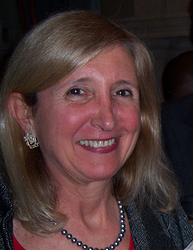The rocky road from Whistleblower to MEP

I knew Marta Andreasen was UKIP Treasurer, yet until yesterday I had been unaware she is number 2 on UKIP’s election list in the South East. I’m not normally in the business of scutinising election lists for a party that mainly consists of batty 60 year old men, but Andreasen is adequately different to merit a blog post.
Lest we forget Andreasen was an accountant hired by the European Commission who, when she discovered errors with the book-keeping systems, aired her complaints rather publicly, and ended up getting sacked by the Commission.
Putting Andreasen second on the UKIP list in the South East is a very interesting choice. First of all she is not British (she was born in Argentina and has Spanish citizenship) and as far as I am aware she does not even live in the UK. As you can tell from this interview in Newbury Today the standard UKIP nationalist rhetoric does not come especially easily to her.
Secondly, I wonder whether the choice of Andreasen marks an interesting departure for UKIP. She ranks alongside Paul van Buitenen, Hans Peter Martin and Hans-Martin Tillack as high profile whistleblowers who have discovered fraud within the EU and the institutions have effectively tried to silence them. These people are not – by definition – anti the EU as such, they are however anti the way that business is conducted.
More specifically, I wonder how Andreasen would vote on a matter such as airline black lists. UKIP MEPs voted against this legislation as far as I am aware – how would Andreasen vote? Essentially will Andreasen be constructive in her euroscepticism, or, standard UKIP style, just vote against everything – even things like airline black lists? It’s going to be interesting to see how this develops.
Of the other 3 whistleblowers I cite, only Tillack has not become a MEP. Martin was elected first in 1999 as a Social Democrat, but fell out with the party and the group, and indeed most of his whistleblowing has been subsequent to his election – he has made films such as this with RTL capturing MEPs profiting from their expenses system. Van Buitenen (unlike Martin) sits with a political group in the EP – the Greens-EFA. Problem is he only votes with them 6.23% of the time according to Votewatch, making him the most rebellious of all MEPs.
In some strange way for all four of these individuals exposing the fraud was actually the easy bit. Finding a way to put things right is much, much harder. Is it better to be on the outside being critical, or be inside the European Parliament trying to reform (or – for UKIP – destroy?) the institutions from within? If Andreasen gets elected she’s going to have a hard time on a number of fronts, not least being number 2 behind Nigel Farage on a UKIP list.
I too am curious about UKIP running Marta Andreasen as an MEP. However, the rules allow a citizen of Spain to stand as an MEP for a region in England – balmy as it sounds – so why not? She has a mission to expose and highlight the arbitrary and inept accounting system (kept so deliberately so that the EU executive can sideline funds for personal projects, personal aggrandizement or plain personal enrichment without having to justify their actions) and this falls right in line with UKIP’s aim of exposing the whole EU project as unworkable.
Having read her book, “Brussels Laid Bare”, Andreasen states clearly that her motivation to expose the rot in the EU executive is because she believes in the EU project. But she concludes that the EU administration is too “corrupt and corrupting” to change.
Jon Worth raises an interesting point as to whether we are witnessing a subtle change in the UKIP mission statement. Previously, we had no doubt that UKIP was against the EU and all its goals to unify Europe. But the EU will have its way and the Lisbon treaty will be ratified. When it is, all parties which are against the principles of the EU will be banned in Europe. That will be the end of UKIP. However, if UKIP repositions itself to say that it is not against the EU, only against the UK being part of the EU, then they could stay in business and continue sending MEPs to Brussels. But, of course, there is a logical inconsistancy there. How can you be _for_ the EU but _against_ one particular country being a member of the EU? So, a further little shuffle results in UKIP being against the UK being a member of the EU, so long as the dealings and finances of the EU are opaque and unaccountable. To survive then, UKIP will have to transform itself into a ginger group campaigning for reform within the EU, recognising the reality that the UK is part of the EU and that there is now now way to get out of it short of a revolution.
With that thought in mind, Marta Andreasen’s choice as an MEP for UKIP is not so strange after all. In fact, it is obvious.